Chloë Smith, GiGL Partnership Manager
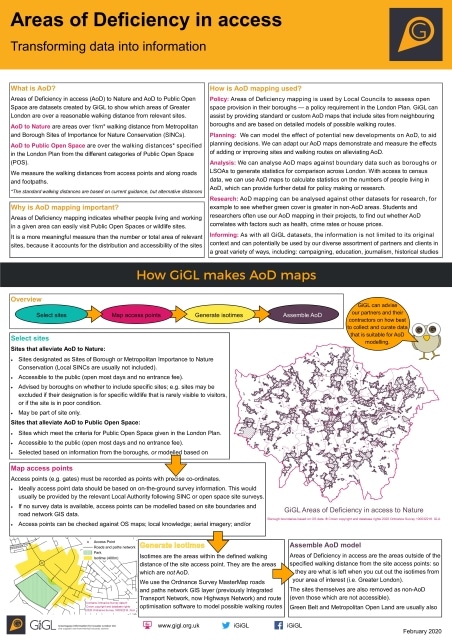
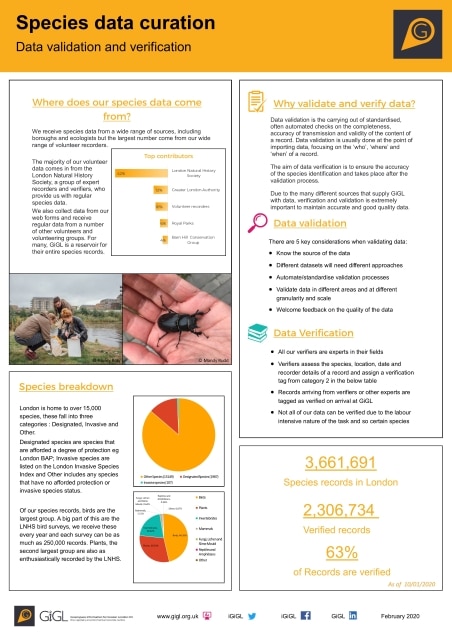
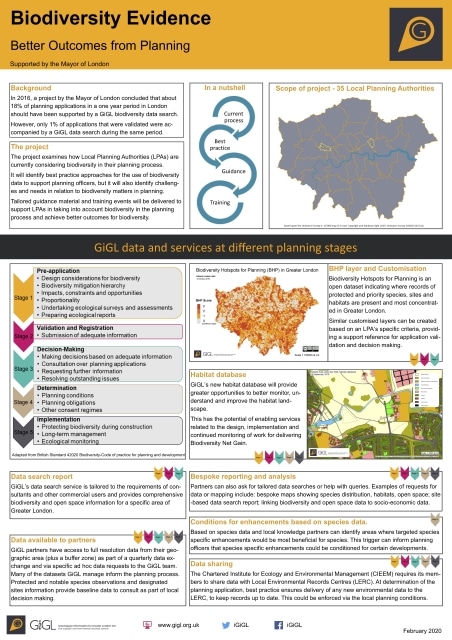
Posters displayed at the event: areas of deficiency in access, species data curation, biodiversity evidence (click to download poster PDFs)
We all have busy diaries, deadlines and daily responsibilities that can make it hard to pause and connect with each other. At GiGL we are mindful that many of our stakeholders work with us directly via their service contracts, or to exchange data, but we rarely meet in a group unless it’s focused on a task in hand. With that in mind, GiGL held its first ‘lunch and learn’ event on 12th February 2020. We wanted to design an event that could enable partners (former or current) to meet each other, meet us, and spend some time talking about service level agreements (SLAs) and ideas for getting more out of these partnership contracts.
The event was really popular and we filled our meeting room with 17 guests from 14 organisations. It was structured around interpreted poster displays, a live data demo and three talks, with time for guests to mingle, talk and ask questions over their buffet lunch.
Talk 1: introduction
I presented a short introduction to the GiGL team, outlining that all members of our 11-strong (9.8 FTE) team support SLA services but that our two Partnership Officers (Emma Knowles and Julie Cox) and I are key contacts for information about SLAs, commissioning work or accessing data. I also gave an overview of GiGL’s SLA services including:
- data services (curation of baselines and sharing of files for reference)
- information services (interpreted outputs such as reports)
- derived datasets (such as Biodiversity Hotspots for Planning and Areas of Deficiency), and
- answers to questions (such as: how many X species?, how much Y space?, how can I analyse Z data?)
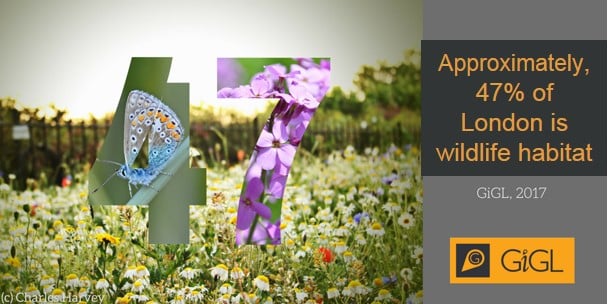
Talk 2: curating sites data for partners
Laura, GiGL’s Database Officer, took us through the databases she looks after and some of the processes involved in making them useful for SLA holders. The Sites of Importance for Nature Conservation (SINC) data represent published policy from individual local authorities that Laura standardises for London. Similarly, protected open spaces are detailed in GiGL’s London-wide Public Open Space (POS) dataset. The open space dataset and habitats dataset are different, reflecting descriptive site-based survey information, rich in attributes to be explored and analysed. Laura explained how she undertakes validation and verification for each dataset, how various sources of data are compiled and some of the novel subset datasets that we have developed from standardised baselines e.g. Privately Owned Public Spaces and Sites to Visit (more news on this coming soon). In her data demo, Laura showcased example data from two boroughs, including a preview of the newly databased habitat data you may have read about in a previous GiGLer article.
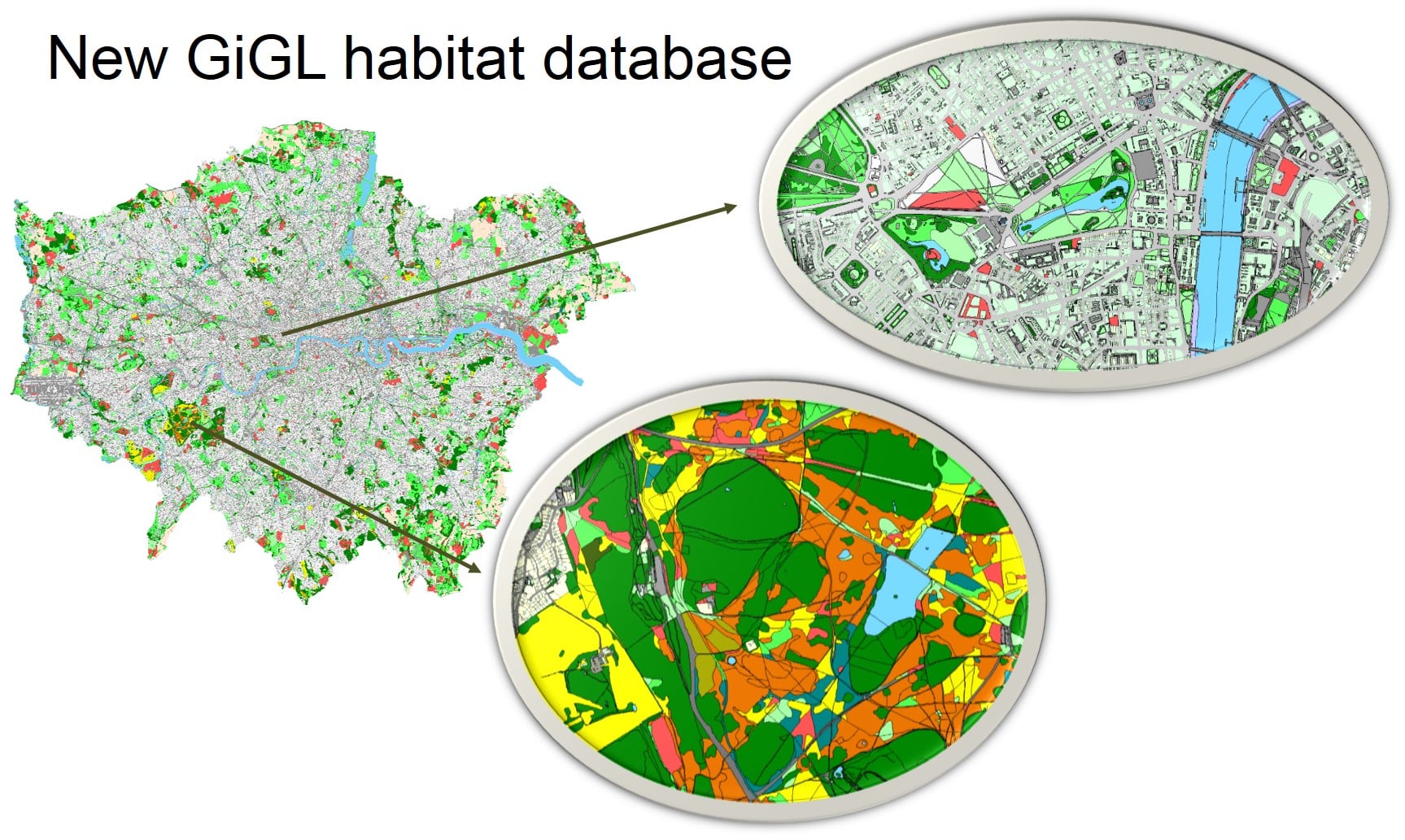
Talk 3: a partner perspective
Tony Wileman from London Wildlife Trust gave our third short talk on working with us from the Trust’s perspective. Tony showed some great examples of how he and colleagues use their SLA. This includes consulting wildlife records from their quarterly data exchange in their desktop GIS to inform their response when they get public enquiries about planning applications.
Tony also gave a powerful illustration of how wildlife observations can be useful even when they are scarce – mole records for Greater London are not as evenly distributed or prevalent as we would expect, especially given the ease of identifying mole hills. Tony proposed the pattern of mapped data suggests an excellent citizen science project: to gather public observations on where they have seen evidence of these underground mammals, fill some gaps and complete the picture. Could ‘Mole Patrol’ or ‘Hill Hunt’ follow on from the successes of LWT’s Kestrel Count, Dragonfly Detectives and the ever popular Staggering Gains? Watch this space!
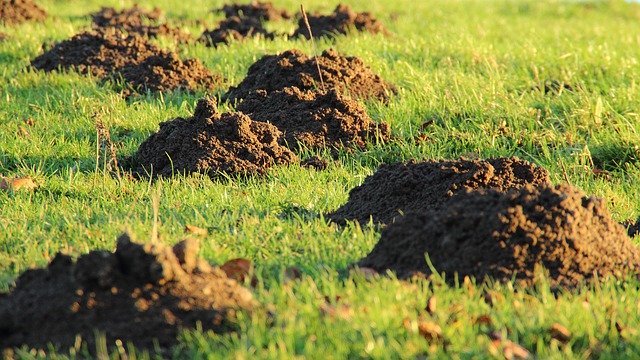
I found it particularly pleasing to see so many SLA partners at our HQ. It was useful to meet new partner reps to put faces to names, as well as catch-up with longer-term partners.
The feedback on the event has been really positive – all respondents said they learnt something new and would attend a similar event in future. Comments have included that it was a good opportunity to network, learn and refresh knowledge and we have a range of suggestions for things to include in a future event including the use of open data, informing Biodiversity Action Plans and more extensive data demonstrations. Thank you to all those who attended and we look forward to hosting more events in the future.

Hello, I’d be very interested in coming along to one of these “Show and Tell” events just as an observer. I run Swift Conservation, working to help Swifts survive and hopefully thrive, and we are (usually, if not right now) sited in Central London. Best wishes, Edward
Hi Edward, thanks for your interest. We’ll add you to the invite list for any relevant events in the future.